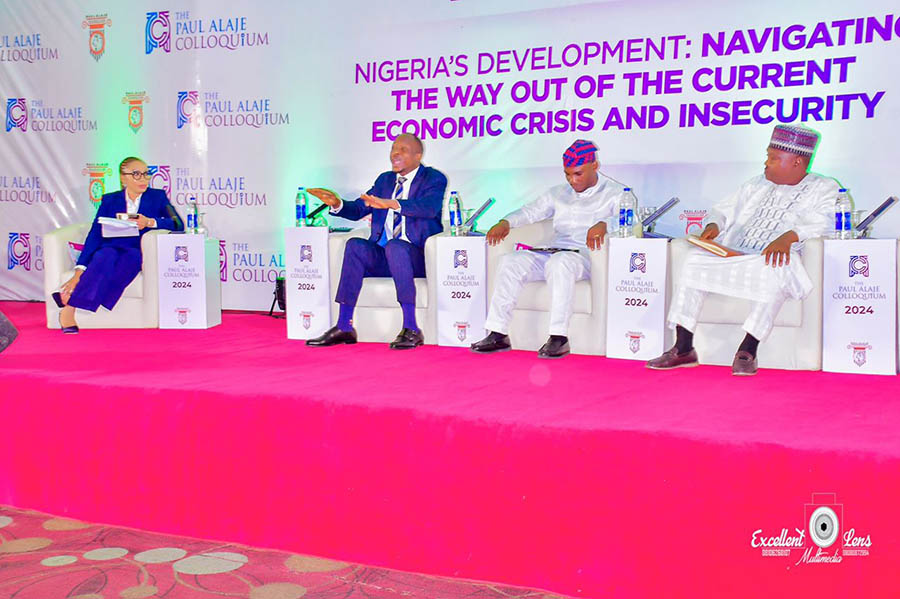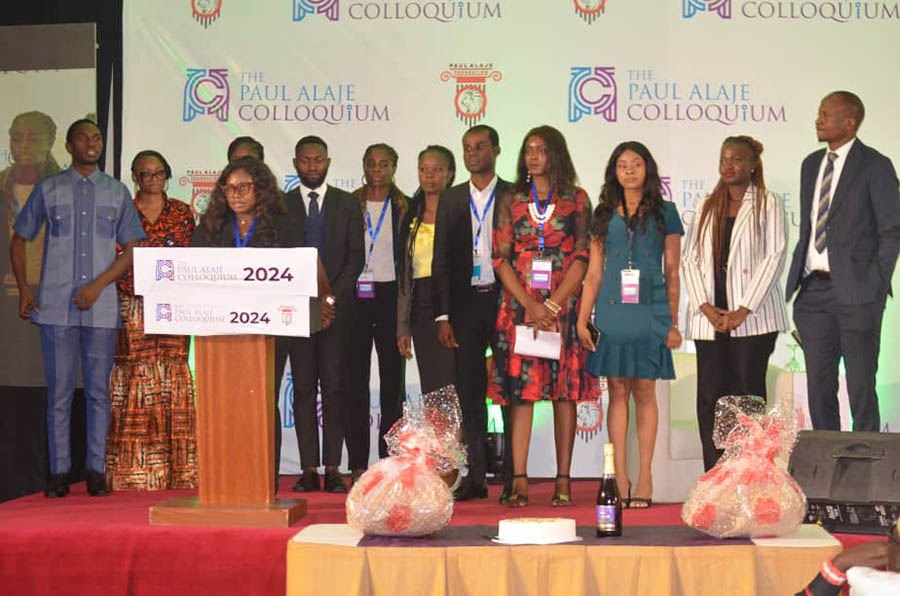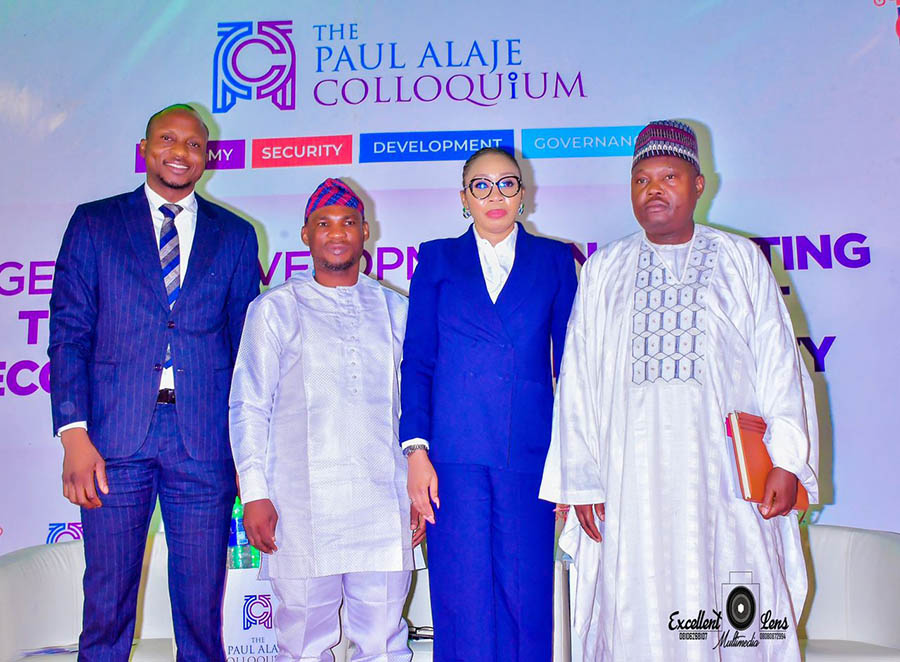
-
IR As Crucial Amid National Economic Challenges, Insecurity
By Jennete Ugo Anya
At the inaugural edition of The Paul Alaje Colloquium (TPAC), held last weekend in Abuja, experts underscored Nigeria’s pressing challenges: an economic crisis worsened by an overdependence on oil exports and widespread insecurity stemming from terrorism and internal conflicts.
The event, themed: ‘Nigeria’s Development: Navigating The Way Out of The Current Economic Crisis and Insecurity,’ featured Chief Olusegun Obasanjo, Former President of Nigeria, as the keynote speaker.
The former president expressed regret over the nation’s economic troubles, blaming them on inconsistent policies, corruption, and the greed of government officials. He pointed to the ongoing fuel scarcity as a clear sign of the government’s inability to implement effective solutions.
Reflecting on his 2007 effort to privatise refineries as a solution to Nigeria’s energy issues, he lamented that his successor reversed this decision. This reversal, he noted, led to the further decline of the refineries and the wastage of billions of dollars in investment.
He urged the government to adopt a transformational leadership style to regain the trust of investors. He also called for the implementation of a 25-year development plan that prioritizes education, food security, energy, industrialization, and technological innovation.

Presenters emphasised that tackling these issues requires a strategic approach anchored on four key pillars: economy, security, development, and governance, with a strong focus on engaging the global investment community.
Angela Omeiza, Chairperson of TPAC, opened the colloquium by outlining its objectives and setting the tone for the discussions. Topics covered included policy and governance, economic diversification, infrastructure, security, military and law enforcement, governance and leadership, accountability, and youth employment.
Among the notable speakers was Chief Audu Ogbe, Former Federal Minister of Agriculture, who delivered an insightful presentation on the economy. Professor Olufemi Saibu, an economist and Director of Quality Assurance and Servicom Unit, as well as the Pioneer Director of the Institute of Nigeria-China Development Studies (INCDS) at the University of Lagos (UNILAG), followed with a thought-provoking economic analysis.
Other distinguished panelists included Dr. Tope Fasua, Economist and Special Adviser to the President on Economic Matters, Mr. Yusha’u Aliyu, Economic Analyst and Chartered Accountant, Captain Aliyu Umar, Security Consultant, ACP Sunday P. Digha, Area Commander, Karu, Abuja, and Mr. Jake Epelle, Founder of TAF Africa.
While investor relations (IR) was not explicitly mentioned during the discussions, the insights shared underscored its importance. Effective IR is vital for attracting and retaining investment, which is essential for driving economic recovery and sustainable development.
In his address, Dr. Paul Alaje stressed the colloquium’s dedication to improving Nigeria, stating: “We are dedicated to seeing a better Nigeria as we focus on proffering solutions to the nation’s economy, social development, leadership and good governance, and sustainable security.” He aims to pursue national development by organising annual national colloquia, quarterly campus colloquia, and an annual national school essay competition.

Dr. Alaje’s goal is “to create platforms where students enhance their writing skills and critical thinking; stakeholders and policymakers share ideas, knowledge, and expertise; and engage citizens to shape national policies. We aim to empower the next generation of leaders and change-makers to participate in nation-building.”
The event was also enlivened by a festival of praise featuring performances by a choir and orchestra, as well as spoken word presentations by Adaobi and Ese Aluko. Additionally, the winners of the essay competition were celebrated: Ademuyiwa Toheed Adetomiwa, winner of category 2, and Merit Eneotu Isaiah, winner of category 1.
The TPAC event highlighted the critical need for strategic engagement and comprehensive solutions to address Nigeria’s economic and security challenges, with an underlying emphasis on the role of investor relations in facilitating sustainable progress.
The Role of IR in Economic Sustainability in the Face of Insecurity
Nigeria’s heavy reliance on oil has rendered its economy highly vulnerable to global price fluctuations. To stabilise and foster economic growth, diversification is imperative. Building investor confidence is essential for attracting investment into non-oil sectors, and this hinges on transparent communication about economic policies, reforms, and opportunities.
A robust investor relations (IR) strategy is crucial for enhancing transparency and reassuring investors about the government’s commitment to creating a stable investment climate.
Effective IR efforts should spotlight opportunities in agriculture, manufacturing, technology, and services. Nigeria’s vast agricultural potential remains largely untapped. Promoting investment in agro-processing industries can create jobs and stimulate rural economies. Likewise, showcasing opportunities in manufacturing and technology can attract foreign direct investment (FDI) and foster industrialization. IR initiatives should focus on communicating the government’s support for these sectors, including incentives and infrastructure development.
Insecurity, particularly from terrorism and internal conflicts, deters investment. A proactive IR approach involves not only addressing these security concerns head-on but also effectively communicating the steps being taken to mitigate them. This includes transparency about security measures, international cooperation in combating terrorism, and efforts to address root causes such as poverty and unemployment.

Investor relations can facilitate collaborations with international security experts and institutions, enhancing Nigeria’s capacity to manage and reduce insecurity. Communicating these partnerships through IR channels can help reassure investors about the safety and stability of their investments.
Corruption undermines investor confidence and hampers economic development. Nigeria must demonstrate its commitment to combating corruption through concrete actions and reforms. Effective IR involves highlighting these efforts and the progress made in improving transparency and accountability. Showcasing successful anti-corruption measures and reforms can significantly boost investor confidence.
Investors seek stable and predictable legal and regulatory environments. Nigeria must strengthen its legal frameworks to protect investments and ensure ease of doing business. Effective IR would communicate ongoing reforms aimed at enhancing the business environment, such as simplifying business registration processes, ensuring contract enforcement, and protecting intellectual property rights.
A skilled workforce is crucial for attracting and retaining investment. Nigeria needs to invest in education and vocational training to build a capable workforce. IR efforts should highlight partnerships with international educational institutions and initiatives aimed at improving education and skills development. Demonstrating a commitment to human capital development can attract long-term investors interested in sustainable growth.
Health is another critical area for socio-economic development. Investments in healthcare infrastructure and services not only improve quality of life but also create a more attractive environment for investors. Effective IR would communicate the government’s health initiatives and partnerships with global health organizations, showcasing Nigeria’s commitment to improving public health.

Nigeria’s participation in the African Continental Free Trade Area (AfCFTA) offers significant opportunities for trade and investment. Effective IR should promote Nigeria as a gateway to the African market, highlighting the benefits of regional integration, such as access to larger markets and reduced trade barriers, to attract investors looking to tap into the continent’s potential.
Engaging in strategic bilateral and multilateral trade agreements can open new avenues for investment. IR strategies should emphasize the advantages of these agreements and how they enhance Nigeria’s trade and investment prospects. Clear communication about the protections and benefits offered to investors under these agreements can encourage foreign investment.
Navigating Nigeria’s current economic crisis and insecurity requires a multifaceted approach, with effective investor relations at its core. By building investor confidence, addressing security concerns, enhancing governance, and showcasing socio-economic development efforts, Nigeria can attract and retain the investment needed for sustainable development. Leveraging investor relations to communicate reforms, opportunities, and partnerships is essential for driving economic recovery and ensuring long-term prosperity.
Discover more from Astudity Limited
Subscribe to get the latest posts sent to your email.